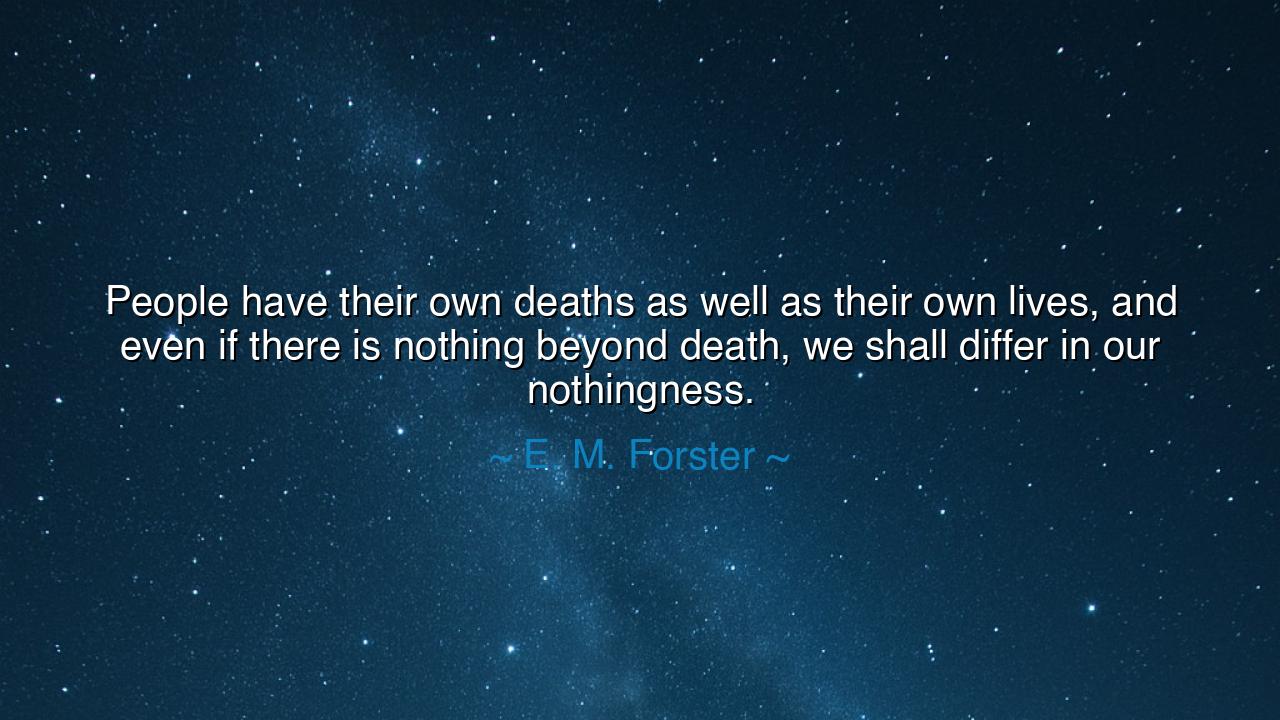
People have their own deaths as well as their own lives, and even
People have their own deaths as well as their own lives, and even if there is nothing beyond death, we shall differ in our nothingness.






In the profound words of E. M. Forster, a writer who dwelt deeply on the soul’s quiet struggles, there lies both melancholy and magnificence: “People have their own deaths as well as their own lives, and even if there is nothing beyond death, we shall differ in our nothingness.” These are not the cold musings of a skeptic, but the reflections of a man who understood individuality not as vanity, but as essence. Forster speaks here of the mystery of being—the truth that even in the face of extinction, the human soul remains distinct, as if each of us carries a flame whose color is uniquely our own.
When he says that people have their own deaths, he means that the way a man departs this life is as deeply personal as the way he lived it. Death is not merely the end of breath—it is the final expression of one’s character, the last gesture of a lifetime’s creation. Some meet it with calm, some with struggle, some with laughter, and some in silence. As each life is a singular poem, so too is each death its final stanza. Forster reminds us that identity does not vanish into the void—it imprints upon it, leaving behind an echo that no eternity can erase.
This truth is not new; the ancients too knew it. Socrates, in his final hour, drank the hemlock with serenity, discussing the immortality of the soul even as his own life ebbed away. His death became a testament to his philosophy—a calm surrender to the truth he had pursued. Contrast him with Achilles, who, knowing his fate, chose glory over longevity, meeting death not with quietness but with fire. Both men, though long turned to dust, differ still in memory and meaning. Their nothingness is not the same; for even if there is no afterlife, the manner of their living and dying shapes how they endure in the minds of those who remain.
Forster’s words carry both defiance and tenderness. In an age when belief in the eternal waned, he found dignity in the finite. Even if death brings nothing—no heaven, no reunion, no divine accounting—still, he says, we are not lost in sameness. Our nothingness bears the mark of who we were: the choices we made, the loves we held, the kindness we offered, the courage we showed. In this, Forster elevates humanity beyond despair. He says, in essence, that meaning does not depend upon eternity; it depends upon authenticity.
Consider the life of Anne Frank, whose young existence was cut short by tyranny. Her death came early and unjust, yet her spirit endures, bright as a lantern through centuries of darkness. Another girl might have perished quietly, forgotten; but Anne’s words gave her death a voice. She too “had her own death”—one transformed by her refusal to let fear define her. Even if, as Forster says, there were “nothing beyond,” her nothingness differs, glowing with compassion and hope.
This is the hidden power of Forster’s philosophy: that individuality transcends even annihilation. If nothing awaits us, then let our nothingness be luminous, a void shaped by beauty and love. For when we live with intention, we shape the silence that follows us. A good life does not conquer death—it converses with it, leaving behind a resonance that time cannot wholly erase.
Let this be the lesson for those who hear: Live in such a way that your death, too, is your own. Do not borrow your beliefs or your courage. Die, when the time comes, as you have lived—honestly, with grace, or with passion, but always with awareness. To live consciously is to die consciously; to love deeply is to leave traces even in oblivion.
For in the end, as E. M. Forster teaches, it may be that there is no paradise awaiting us—but there is something far greater: the power to make our own meaning. And when the light fades, and we return to the great silence, we shall indeed differ, even in our nothingness, for we will have lived as ourselves—and that, in itself, is immortality.






AAdministratorAdministrator
Welcome, honored guests. Please leave a comment, we will respond soon